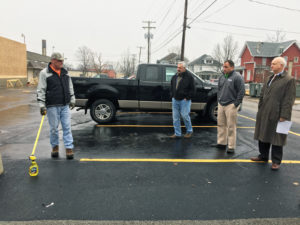

Tiffin City Councilman and Army veteran Steve Lepard
Lepard said before recently, he never considered himself a veteran because he didn’t serve in a war.
“I look at my heroes from Attica and from other locations, they all had boots on the ground,” he said.
Every day of his life, Lepard wears a silver bracelet with the name of Staff Sergeant Dale E. Williams. Williams, an Attica native, died in Cambodia in 1970, during his second tour of duty.
Before William’s second deployment, he told Lepard he likely wouldn’t return.
“I think of him every day. For a small village, we had so many people serve in Vietnam. It was unbelievable. Four of them lived on the same road,” he said.
Lepard said he has many friends who are Seneca County veterans. He is friends with veterans from WWII and from the Korean War.
“A good friend of mine who passed away 10-12 years ago, he was a medic,” he said. “He stormed the beaches of Normandy.”
Lepard said he saw the effects of Post-Traumatic Stress Disorder on some of his friends who served in Vietnam.
“War is hell, everybody loses, regardless if you claim yourself a winner,” he said.
What branch did you serve in and why?
The Army, because my father and my uncles served in the Army. It was a family tradition. I was in from 1972-1974, I was one of the only people in my boot camp that had a two-year enlistment. They were totally unheard of, but I didn’t want to commit to any more than that. I was just out of high school.
Why did you serve?
I needed a little direction, I think. I needed something different in my life than the daily routine of factory work. It was the best decision in the world I ever made. It made a man out of me pretty darn quick. It taught me a lot of skills. Skills that I later used that I never know I would have.
What was your job/assignment?
I worked with short-range, intermediate-range nuclear warheads. I had 20 warheads that I was indirectly responsible for. Plus, I was in charge of the entire battalion’s basic load ammunition, ranging from a .45 pistol to nuclear warheads and everything in between. The warheads I was working with would’ve done 20 times the damage of the atomic bomb dropped on Hiroshima.
I was in charge of a lot of training as well. I went through a demolition course and taught officers how to destruct warheads, how to blow them up before we were overrun. Also, I did all the training for ammunition and explosives. I was in charge of the receipt, inspection, distribution and accountability of the weapons.
What are some memorable moments?
The scariest moment I ever had, the first month that I was in Europe, I was assigned to a security platoon. We guarded the warhead bunkers. I was in a tower when a Black Mercedes pulled up to a fence about 20 feet away from my tower. A guy got out of the car, assembled his rifle, mounted a large scope and walked into the woods. At the time we were having a lot of issues with the enemy that we didn’t know. It was during Black September of the 1972 Olympics. We had some radicals state that they would steal a warhead or blow up ammo. I called out the 30-man backup unit for security and to track him down. We finally caught up with the guy, luckily he was the one that owned the property that leased it to the government. We definitely had a few scares.
We were the first to ever enable a warhead in a peaceful situation. It was during the nuclear agency technical standardization inspection. An international group came in and we were asked if we knew how to enable a warhead, we said yes, they said to do it. The next day after we completed the task, we were transferred to a brigade inspection team. It turned out that we (Lepard and his fellow soldier) had more knowledge, ability and leadership qualities compared to the rest of the platoon, so they moved us out.
Being a little sergeant, walking up to the lieutenant colonel and doing inspections … I was pretty proud of that, getting to wear a purple hat instead of a green one.
What were some of the challenges you faced?
When we were stationed in Europe, we were hated. The town was known as a dump site during World War II, they hated us there. Also, going back to the Black September situation, that was tough for us because during our off-duty time, we spent it just walking around town and looking for certain license plate numbers. Every day, they’d drop ten of us off, we’ll see you in about two hours and we’ll move to another location.
It was also kind of difficult for me because I was thrust into a leadership position at a young age. I kind of had to work through those situations at times. Dealing with disrespect from others that had more time in than I did. That was tough, I was a buck sergeant, but I was working in an E7 position for a short period of time. Especially with training officers, they look down having a buck sergeant instruct them.
